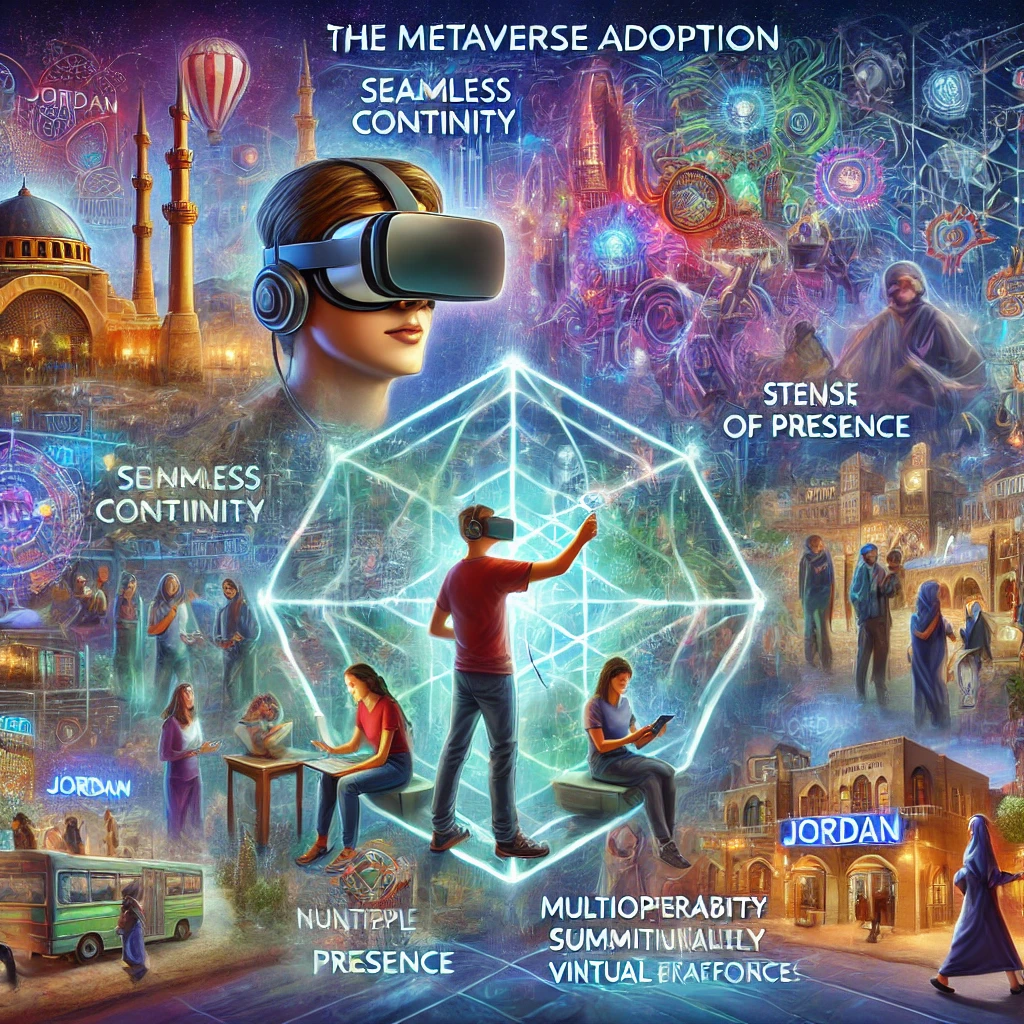Transforming Digital Business: The Influence of Entertainment Content Marketing on Metaverse Adoption in Jordan
A study by Jordanian Universities investigates how entertainment content marketing influences metaverse adoption, using the SPICE framework (continuity, sense of presence, interoperability, concurrence, and economic flow). The findings show these factors positively impact users' intentions to use the metaverse, highlighting its potential beyond gaming to transform sectors like commerce and entertainment. The study emphasizes the importance of creating immersive and interactive metaverse experiences to enhance user engagement and drive adoption rates.

A study by Al-Ahliyya Amman University, Middle East University, and Applied Science Private University, Jordan explores the influence of entertainment content marketing on the adoption of the metaverse, particularly in Jordan. The metaverse, a virtual reality space where users interact with a computer-generated environment and others, has vast potential to transform digital business. Despite this promise, there is limited research on how content marketing affects users' intentions to use the metaverse. This study aimed to bridge this gap by examining whether entertainment content marketing influences users to adopt the metaverse, using data from an online survey of 454 online gamers in Jordan.
The SPICE Framework: Key Factors in Metaverse Adoption
The researchers employed the SPICE framework, which includes continuity, sense of presence, interoperability, concurrence, and economic flow, to analyze the data using structural equation modeling with partial least squares analysis. The findings revealed that all five factors positively impacted users' intention to use the metaverse. Continuity, or the seamless linking of activities on a single platform, was found to be crucial as it enhances users' connection with the platform and influences their purchasing decisions. A sense of presence, the feeling of being physically present in a virtual environment, also played a significant role, leading to greater emotional involvement and social interactions, which in turn boost trust and shopping intention.
Interoperability, the ability of the metaverse to connect and interact with other digital platforms, ensures a consistent and personalized shopping experience across various virtual spaces, retaining users' previous purchases and preferences. Concurrence, which allows multiple users to have diverse experiences within the metaverse simultaneously, positively influenced shopping intention by offering a wide range of products and services that cater to individual preferences. Economic flow, or the ease of conducting transactions within the metaverse, was also important as a smooth and user-friendly shopping experience encourages users to engage in economic activities like buying digital assets and participating in virtual commerce.
The Metaverse: Beyond Entertainment
The study highlighted the significant potential of the metaverse beyond entertainment, especially in regions like Jordan with a growing digital landscape. The young, tech-savvy population and robust digital infrastructure make Jordan a fertile ground for metaverse adoption. These findings have practical implications for marketers and businesses. To enhance user engagement and drive shopping intention, they should focus on creating immersive and interactive experiences in the metaverse. Emphasizing continuity, a sense of presence, interoperability, concurrence, and economic flow can help build a strong connection with users and increase adoption rates.
Technological Integration and Market Potential
Telecommunication technology has been essential in maintaining connectivity, especially during the pandemic, allowing remote communication through video conferencing and online meetings. This shift has enabled employees to work from home and students to continue their education via remote classes. Additionally, live e-commerce has replaced traditional stores, facilitating online shopping. The integration of AI and fourth industrial revolution technologies has streamlined processes, reduced costs, and increased productivity, making daily life more efficient.
The metaverse has emerged as a significant platform during the COVID-19 downturn, attracting venture capitalists due to its potential to revolutionize business and content interactions. It leverages advanced visual technology, 5G networks, and pioneering display devices, offering a unique and engaging digital universe. This platform allows users to engage in activities without physical or temporal restrictions, making it highly appealing in the e-contact era. Accessible via PCs and smart devices, the metaverse provides continuous availability and high connectivity. As the fourth industrial revolution advances, the metaverse's role in the industry and marketplace becomes increasingly critical, driven by the development of smart device technology and digitally mediated networks. This evolution highlights the metaverse's growing importance in meeting the demands of a more digitally connected society.
Transforming Industries: From Gaming to Commerce
Initially, the metaverse was mainly linked to the gaming industry in the early 2000s. It has since expanded into sectors like performance, fashion, commerce, and sports, becoming a powerful marketing tool in the e-contact age. Advanced technologies and AI have reduced the need for physical contact, making smartphones essential for accessing the metaverse due to their 5G capabilities and integration with various devices.
Entertainment content marketers are discovering the metaverse's potential for engaging viewers through immersive experiences. The metaverse offers unique opportunities for interactive storytelling, allowing users to shape stories in real-time. This interactive nature caters to digital-savvy users seeking personalized content, fostering deep connections, brand loyalty, and higher engagement.
Additionally, the metaverse extends the lifespan of entertainment content and creates new revenue streams through virtual shows and gaming experiences, accessible globally without physical venue limitations. It enables monetization through ticket sales, virtual goods, and brand sponsorships. Data insights gathered from user activities enhance content strategies and marketing efficacy.
The study highlights the metaverse's potential to transform digital business, emphasizing the need for research on factors influencing its adoption. Focusing on Jordan, it reveals how cultural and economic factors affect metaverse adoption in emerging markets. The SPICE framework provides insights into user engagement, helping businesses create immersive, appealing metaverse experiences and driving higher adoption rates.
- FIRST PUBLISHED IN:
- Devdiscourse
ALSO READ
Flight operations impacted after roof collapsed at T-1 of Delhi airport, informs IndiGo and SpiceJet
Delhi Airport Shuffles SpiceJet and IndiGo Flight Terminals
India supports advancement of standards for spices to enhance international trade
India Advocates for Higher Spice Standards at Rome's Codex Meet










